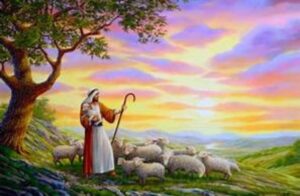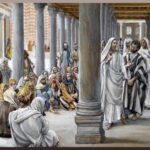John Chapter 10:1-42 King James Bible KJV

Parable of the Good Shepherd, Jesus as the Good Shepherd, Accusation of Blasphemy and Jesus’ Defense, Jesus Retreats Across the Jordan
John Chapter 10:1-42 King James Bible KJV. John 10 emphasizes Jesus as the Good Shepherd, who knows and protects His sheep, offering them eternal life and security. This chapter explores themes of protection, guidance, salvation, and the intimate relationship between Jesus and His people. The chapter highlights the contrast and deepens the conflict between true spiritual leadership (Jesus as the Good Shepherd) and the false leadership of the religious authorities/leaders (thieves and robbers). Jesus’ willingness to lay down His life for His followers foreshadows His crucifixion and reveals the depth of His sacrificial love.
Key theological themes include:
- Jesus as the Only Way to Salvation: He is the gate through which people must enter to find eternal life.
- The Intimacy of Jesus’ Relationship with His Followers: Jesus knows His sheep by name, and they know His voice, emphasizing the personal and relational nature of faith.
- Jesus’ Divine Identity: His claim to be one with the Father underscores His divine nature and mission, leading to increased opposition from the religious leaders.
- Spiritual Sight and Blindness: Once again, the chapter emphasizes that only those who are open to the truth will recognize Jesus’ voice and follow Him, while others remain blind to His identity.
The chapter provides a powerful portrayal of Jesus’ role as the Good Shepherd and highlights the themes of divine love, salvation, and the call to follow and trust in Him.
John Chapter 10:1-42 King James Bible KJV
—————-

The Parable of the Good Shepherd – verses 1–6
Jesus begins by describing a scenario where sheep are kept in a pen, and the only legitimate way to enter is through the gate. He contrasts the shepherd, who enters through the gate, with thieves and robbers who try to climb in another way. The sheep recognize the shepherd’s voice and follow him, while they flee from strangers. This analogy draws from a familiar pastoral setting in first-century Palestine but points to deeper spiritual truths about Jesus’ role as the legitimate leader and protector of God’s people.
Key Themes:
- Jesus as the True Shepherd: Jesus is the rightful leader of God’s people, entering by the legitimate way (through God’s authority and purpose).
- Recognition of His Voice: Those who belong to Jesus will recognize His voice and follow Him, indicating a relationship of trust and familiarity.
- Spiritual Leaders: The thieves and robbers represent false leaders who harm the flock (God’s people).

Jesus as the Gate for the Sheep – verses 7–10
Jesus expands on the metaphor, declaring, “I am the gate for the sheep.” He contrasts His role as the gate with the thieves and robbers who come to “steal, kill, and destroy.” Jesus promises abundant life for those who enter through Him. Jesus is not only the shepherd but also the gate, emphasizing that He is the only way to salvation. Those who enter through Him will be saved and find spiritual nourishment and protection.
Key Themes:
- Jesus as the Only Way to Salvation: Jesus identifies Himself as the gate, meaning He is the only entry point to eternal life and fellowship with God.
- Abundant Life: Jesus promises that those who follow Him will experience “life to the full,” meaning a rich, meaningful, and eternal relationship with God.
- Contrast with False Leaders: The thieves and robbers symbolize false teachers or religious leaders who harm rather than protect and nurture the people.

Jesus as the Good Shepherd – verses 11–18
Jesus makes a powerful declaration: “I am the good shepherd. The good shepherd lays down his life for the sheep.” He contrasts Himself with a hired hand who runs away when danger comes because he doesn’t truly care for the sheep. Jesus speaks of the deep, personal relationship He has with His followers, comparing it to the relationship between Him and His Father. This passage reveals Jesus’ sacrificial love, as He declares that He will lay down His life for His sheep. He also emphasizes that His relationship with His followers is intimate and based on love and mutual recognition.
Key Themes:
- Jesus as the Sacrificial Shepherd: Jesus willingly lays down His life for His sheep, foreshadowing His crucifixion. This sacrificial act demonstrates His love and commitment to His followers.
- Personal Relationship: Jesus knows His sheep personally, just as the sheep know Him. This intimacy mirrors His relationship with the Father.
- Unity of the Flock: Jesus hints at the inclusion of Gentiles in the Kingdom, saying He has “other sheep” who are not of the Jewish fold. They too will hear His voice, and there will be one flock and one shepherd.
- Divine Authority: Jesus has the authority to lay down His life and take it up again (a reference to His resurrection), given by the Father. This further establishes His divine nature and mission.

Division Among the Jews – verses 19–21
After Jesus’ teachings about being the Good Shepherd, there is division among the Jews. Some accuse Him of being demon-possessed or insane, while others argue that His teachings and the miracle of healing the blind man (John 9) could not come from a demon. Jesus’ claim to be the Good Shepherd, coupled with His earlier miracles, creates controversy. Some people are open to the possibility that He is from God, while others outright reject Him.
Key Themes:
- Division Over Jesus’ Identity: As seen throughout the Gospel of John, Jesus’ words and actions provoke strong reactions, revealing who is spiritually blind and who is beginning to see the truth.
- Recognition of Jesus’ Authority: While some reject Him, others see His miracles and hear His teaching as evidence of divine authority.


Jesus’ Claim to Divinity – verses 22–30
During the Feast of Dedication (Hanukkah), the Jews ask Jesus to tell them plainly if He is the Messiah. Jesus responds by saying that He has already told them, and His works testify to His identity, but they do not believe because they are not His sheep. He then makes the bold statement, “I and the Father are one.” Jesus reiterates that His works (miracles and teachings) are clear evidence of His divine identity. However, only His true followers—His sheep—recognize His voice and believe. His declaration of oneness with the Father reveals His divine nature and unity with God.
Key Themes:
- Jesus as the Messiah and the Son of God: Jesus’ works (healing, teaching, miracles) testify to His identity, but many reject Him because they are spiritually blind.
- Oneness with the Father: Jesus’ claim to be one with the Father points to His divine nature and equality with God, a profound theological statement that leads to increased hostility from the Jewish leaders.

Accusation of Blasphemy and Jesus’ Defense – verses 31–39
The Jews react to Jesus’ claim to be one with the Father by attempting to stone Him for blasphemy. Jesus defends Himself by pointing to Scripture (Psalm 82:6), where human judges are called “gods” because they act as God’s representatives. He argues that if Scripture can use such language, how much more should He, whom the Father has sanctified and sent into the world, be called the Son of God. Jesus’ defense is both a theological and scriptural argument, highlighting that His claims are not blasphemous but rooted in His divine mission. He emphasizes that His works confirm His divine nature and that those who see and believe in His works should recognize that He is from God.
Key Themes:
- Jesus’ Authority in Scripture: Jesus skillfully uses Scripture to defend His claim to divinity, revealing His deep understanding of God’s Word and His unique relationship with the Father.
- Rejection and Unbelief: Despite the clear evidence of His works, many still reject Jesus, demonstrating the depth of their spiritual blindness.

Jesus Retreats Across the Jordan – verses 40–42
After this intense confrontation, Jesus retreats across the Jordan, where many people come to Him. These people remember the testimony of John the Baptist and believe in Jesus based on His works and teachings. The contrast between the hostility of the religious leaders and the belief of the people across the Jordan highlights the varied responses to Jesus. While some remain spiritually blind and hostile, others see and believe.
Key Themes:
- Faith and Belief: Many people who had heard John the Baptist’s testimony about Jesus now come to believe in Him, affirming the truth of John’s message.
- Opposition vs. Faith: Jesus’ rejection by some religious authorities contrasts with the growing faith of those who recognize Him as the Messiah.
John Chapter 10:1-42 King James Bible KJV
1 Verily, verily, I say unto you, He that entereth not by the door into the sheepfold, but climbeth up some other way, the same is a thief and a robber.
2 But he that entereth in by the door is the shepherd of the sheep.
3 To him the porter openeth; and the sheep hear his voice: and he calleth his own sheep by name, and leadeth them out.
4 And when he putteth forth his own sheep, he goeth before them, and the sheep follow him: for they know his voice.
5 And a stranger will they not follow, but will flee from him: for they know not the voice of strangers.
6 This parable spake Jesus unto them: but they understood not what things they were which he spake unto them.

7 Then said Jesus unto them again, Verily, verily, I say unto you, I am the door of the sheep.
8 All that ever came before me are thieves and robbers: but the sheep did not hear them.
9 I am the door: by me if any man enter in, he shall be saved, and shall go in and out, and find pasture.
10 The thief cometh not, but for to steal, and to kill, and to destroy: I am come that they might have life, and that they might have it more abundantly.

11 I am the good shepherd: the good shepherd giveth his life for the sheep.
12 But he that is an hireling, and not the shepherd, whose own the sheep are not, seeth the wolf coming, and leaveth the sheep, and fleeth: and the wolf catcheth them, and scattereth the sheep.
13 The hireling fleeth, because he is an hireling, and careth not for the sheep.
14 I am the good shepherd, and know my sheep, and am known of mine.
15 As the Father knoweth me, even so know I the Father: and I lay down my life for the sheep.
16 And other sheep I have, which are not of this fold: them also I must bring, and they shall hear my voice; and there shall be one fold, and one shepherd.
17 Therefore doth my Father love me, because I lay down my life, that I might take it again.
18 No man taketh it from me, but I lay it down of myself. I have power to lay it down, and I have power to take it again. This commandment have I received of my Father.

19 There was a division therefore again among the Jews for these sayings.
20 And many of them said, He hath a devil, and is mad; why hear ye him?
21 Others said, These are not the words of him that hath a devil. Can a devil open the eyes of the blind?

22 And it was at Jerusalem the feast of the dedication, and it was winter.
23 And Jesus walked in the temple in Solomon’s porch.
24 Then came the Jews round about him, and said unto him, How long dost thou make us to doubt? If thou be the Christ, tell us plainly.
25 Jesus answered them, I told you, and ye believed not: the works that I do in my Father’s name, they bear witness of me.
26 But ye believe not, because ye are not of my sheep, as I said unto you.
27 My sheep hear my voice, and I know them, and they follow me:
28 And I give unto them eternal life; and they shall never perish, neither shall any man pluck them out of my hand.
29 My Father, which gave them me, is greater than all; and no man is able to pluck them out of my Father’s hand.
30 I and my Father are one.

31 Then the Jews took up stones again to stone him.
32 Jesus answered them, Many good works have I shewed you from my Father; for which of those works do ye stone me?
33 The Jews answered him, saying, For a good work we stone thee not; but for blasphemy; and because that thou, being a man, makest thyself God.
34 Jesus answered them, Is it not written in your law, I said, Ye are gods?
35 If he called them gods, unto whom the word of God came, and the scripture cannot be broken;
36 Say ye of him, whom the Father hath sanctified, and sent into the world, Thou blasphemest; because I said, I am the Son of God?
37 If I do not the works of my Father, believe me not.
38 But if I do, though ye believe not me, believe the works: that ye may know, and believe, that the Father is in me, and I in him.
39 Therefore they sought again to take him: but he escaped out of their hand,

40 And went away again beyond Jordan into the place where John at first baptized; and there he abode.
41 And many resorted unto him, and said, John did no miracle: but all things that John spake of this man were true.
42 And many believed on him there.
You must be logged in to post a comment.